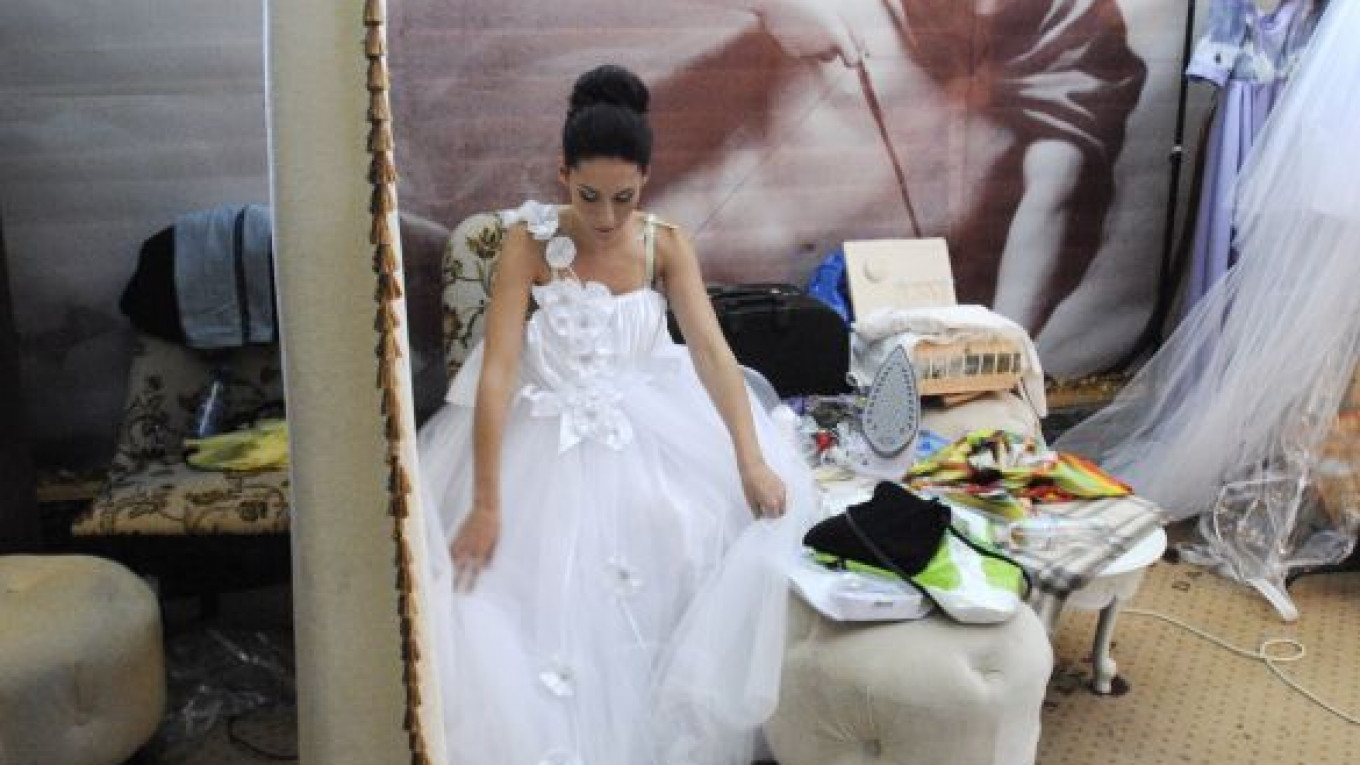KIEV — At a glitzy Kiev nightclub brimming with neon lights and energetic pop music, the models showed off sleek evening gowns and glamorous hats as Ukraine's celebrities cheered on.
But this was no ordinary fashion show. Some models rolled on wheelchairs; others were blind.
At the Wednesday night event, dubbed Fashion Chance, a dozen designers, mostly from Ukraine, presented outfits for women with physical disabilities in a bid to bring attention and dignity to some of Ukraine's most marginalized citizens.
In a country where most buildings lack wheelchair ramps and only a few public schools accept disabled children, the show was a small but vivid step toward removing the stigma that cloaks Ukraine's disabled.
"People in wheelchairs, the blind, the handicapped should all feel accepted," said 26-year-old Ilona Slugovina, an avid wheelchair ballroom dancer, who modeled a glittery lilac-colored evening dress.
Some models moved confidently down the runway — in wheelchairs or accompanied by handsome young men in elegant suits — flashing smiles, and some attempted to mimic the traditional model gait.
One blind model coquettishly held her hand on her hip and played with a lock of hair. Others appeared nervous.
Moved by the show, some in the audience cried.
"I felt beautiful; I felt confident," said Antonina Krivobok, who masterfully rolled and turned around in a wheelchair and posed in front of television cameras as she presented a purple evening dress.
Beginning and already-established designers presented elegant dresses and suits for women in wheelchairs or with other disabilities.
Some of the outfits differed little from what ambulatory women would wear, while others were cut in a more voluminous fashion to accommodate the needs of those in wheelchairs.
"God made the woman beautiful, and the designer's goal is to stress that beauty," said Natalia Anri, a top Ukrainian designer.
But it wasn't just about clothes.
Yulia Kozluk, 28, who runs a fund that trains and then finds computer jobs for people in wheelchairs like herself, said she hoped such projects would help Ukrainian society grow up and accept people who are different.
"When I roll in my wheelchair, people stare at me like I am an alien, and it wounds," said Kozluk, who became paralyzed at age 23 after a car accident. "But I am not an alien. I am a regular person."
Ukraine's physically disabled people are barely visible to the country at large, confined to their homes in the absence of ramps, elevators and specially equipped buses, and mostly shunned by society in a grim legacy of the Soviet era.
The Soviet authorities aimed to maintain the image of a happy and healthy society devoid of any problems, isolating many disabled, including maimed World War II soldiers, in specialized institutions and even on remote islands where they could not be seen by the general public.
Discussing the plight of people with disabilities was virtually taboo in Soviet media.
Today, children with disabilities are usually hidden away in specialized schools or orphanages, where they are deprived of a chance to interact with other children.
Society as a whole does not learn to coexist, accept and help people with disabilities.
Only a handful of public schools accept disabled children because building entrances, cafeterias and toilets are not equipped with ramps, teachers lack the necessary training, and other students — and often their parents — object.
In Kiev, home to tens of thousands of disabled children of school age, only about 10 schools provide inclusive education, said Larisa Baida, an education activist for Ukraine's National Assembly for the Disabled.
"It's sad," Baida said. "It's a constant struggle. Every day they fight for their life."
The Education Ministry declined comment for this story.
Universities also offer very few chances for the disabled, lacking audio books for hearing-impaired students and computers for the blind.
Since Ukraine gained independence from the Soviet Union more than 20 years ago, not a single book in Braille has been published, according to the Assembly.
Only a handful of news programs on television are translated into sign language, while none of entertainment shows for adolescents or children is accessible for the hearing-impaired.
Most Ukrainian websites, including those of the president and the government, lack the special software that allows the blind to convert them into audio.
Finding a job is also a major problem, with only about 25 percent of the country's disabled employed, mostly in low-skill and low-paying jobs, according to the United Nations Development program.
"When we look at a disabled person, we are not ready to see a person in them" who wants to study, work and eat at restaurants, said Natalia Skripka, Assembly's director. "While we should first be seeing a person and only then notice their peculiarities: Are they tall or short, do they have blond or dark hair, do they have disabilities or not."
A Message from The Moscow Times:
Dear readers,
We are facing unprecedented challenges. Russia's Prosecutor General's Office has designated The Moscow Times as an "undesirable" organization, criminalizing our work and putting our staff at risk of prosecution. This follows our earlier unjust labeling as a "foreign agent."
These actions are direct attempts to silence independent journalism in Russia. The authorities claim our work "discredits the decisions of the Russian leadership." We see things differently: we strive to provide accurate, unbiased reporting on Russia.
We, the journalists of The Moscow Times, refuse to be silenced. But to continue our work, we need your help.
Your support, no matter how small, makes a world of difference. If you can, please support us monthly starting from just $2. It's quick to set up, and every contribution makes a significant impact.
By supporting The Moscow Times, you're defending open, independent journalism in the face of repression. Thank you for standing with us.
Remind me later.






